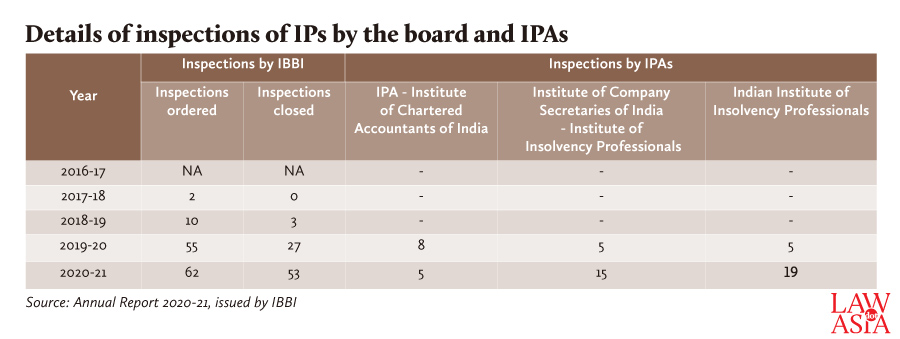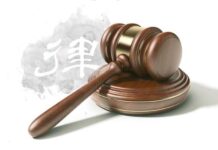As the insolvency and bankruptcy board turns up the heat on insolvency practitioners, Karuna Sharma and Atul Malhotra examine the tools of inspection and investigation at their disposal to ensure compliance with the code
T he Insolvency and Bankruptcy Board of India (IBBI) has lately been resorting to stricter enforcement measures against insolvency service providers including professionals, professional agencies and information utilities, to enforce compliance with the Insolvency and Bankruptcy Code, 2016 (IBC), as it matures.
In 2022, it suspended the registrations of many insolvency professionals (IPs) for up to three years, imposing costs of hundreds of thousands of rupees. In other cases, it ordered IPs to undergo probation, with specified hours on a pre-registration educational course. In one case, an IP was even directed to refund 50% of their fee.
Inspections and investigations under chapter VI of the IBC are mechanisms to monitor compliance with various regulations, rules and guidelines for service providers, who are required to follow the code strictly.
In addition, the code of conduct for IPs mandates that they must conduct themselves with integrity and honesty in their professional capacity.
To keep watch on service providers, the code empowers the IBBI to conduct inspections, investigations, gather information about service providers and monitor their conduct on a regular basis, along with quasi-judicial functions such as addressing complaints against service providers and taking suitable corrective measures.
Sections 217-220 of chapter VI of the code regarding provisions of the IBBI (Inspection and Investigation) Regulations, 2017, primarily deal with inspections and investigations of service providers.
These are conducted to ensure records related to the processes under the code are appropriately maintained, ascertaining whether adequate control systems and procedures have been established and followed, and whether service providers are eligible and fit to perform their duties.
WHAT INVESTIGATIONS ENTAIL
The regulations enable the insolvency board to inspect a certain number of service providers annually in random checks, in addition to inspections or investigations of received complaints or grievances. Insolvency professional agencies (IPAs) are also empowered to conduct inspections monitoring compliances under the code.
Based on complaint or reasonable grounds that a service provider has contravened any provisions of the code, the IBBI may direct an inspecting/investigation authority (IA) to inspect or investigate. While inspection may be considered a routine check by the insolvency board, investigation is a deeper probe, generally arising from a complaint or apprehension of a transgression or felony.
In 2020-21, the board disposed of just over 2,000 complaints. If the IBBI considers a prima facie case exists in a complaint, it may order an inspection or investigation, or issue a “show cause notice”, as may be warranted.
As a matter of process, the IA serves a notice of inspection/investigation to the service provider before commencing inspection, subject to belief it will not cause undue delay in inspection/investigation, and there is no apprehension of records being destroyed, mutilated, altered or falsified.
SCOPE OF INSPECTION/INVESTIGATION
Before commencing inspection/investigation, the service provider is required to furnish information, documents and records, and allow the IA access to their premises, if required. Investigators may examine and record statements of the service provider, and the board may further direct any associated person to produce records and information or make statements, if required.
Based on the nature and progress of an inspection/investigation, the IA may submit an interim report to the board for further reference to the disciplinary committee, if required. Otherwise, a draft inspection report is issued to the service provider requiring comments within a specified period. Finally, an inspection report is submitted to the board.
Wherever matters are referred for disciplinary proceedings, a “show cause notice” is issued to the service provider, with a disciplinary proceeding considered as pending. Until the matter is settled by the disciplinary committee, an IP issued with a notice cannot accept fresh assignments as a resolution professional, liquidator or bankruptcy trustee under the code.
In 2020-21, a total of 50 show cause notices were issued by the IBBI (compared to 14 in 2019-20), while 48 were disposed of (compared to seven in 2019-20).
Based on a sample size of 85 orders issued in 2021 and 2022, most contraventions related to: delays and inconsistencies in various reporting requirements and disclosures under the code; irregularities with regard to the appointment of registered valuers; charging exorbitant fees; not acting independently; and not adhering to timelines and processes provided under the code, and relevant regulations for constitution and the conduct of committee of creditors meetings.
PENALTIES RESERVED
For contraventions, the committee is empowered to impose a penalty equivalent to: (1) three times the amount of the loss caused, or likely to have been caused, to persons concerned on account of such contravention; or (2) three times the amount of the unlawful gain made on account of such contravention, whichever is higher. Where loss or unlawful gain is not quantifiable, the total penalty shall not exceed more than INR10 million (USD122,000).
It should be noted that there is currently no established appeal mechanism. Hence, aggrieved service providers have no option except for filing a writ petition before the high courts or Supreme Court. However, recommendations have recently been made for suitable amendments to the code establishing a procedure for filing appeals before the National Company Law Appellate Tribunal. Except for very few matters where references are made to the committee in respect of other professionals, the board seems have made reference against IPs only. However, with the passage of time, more and more service providers are expected to come under the governance regime of inspections and investigations.
These monitoring mechanisms are fundamental to governance and observance of the legislation, and for taking appropriate corrective action by the service provider community.
You must be a
subscribersubscribersubscribersubscriber
to read this content, please
subscribesubscribesubscribesubscribe
today.
For group subscribers, please click here to access.
Interested in group subscription? Please contact us.
























